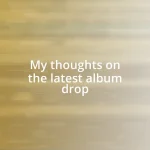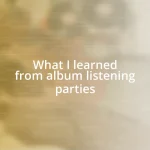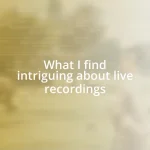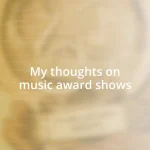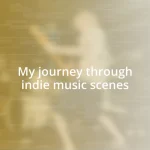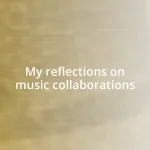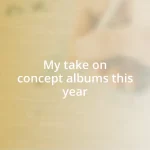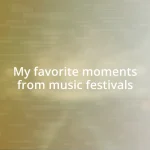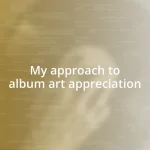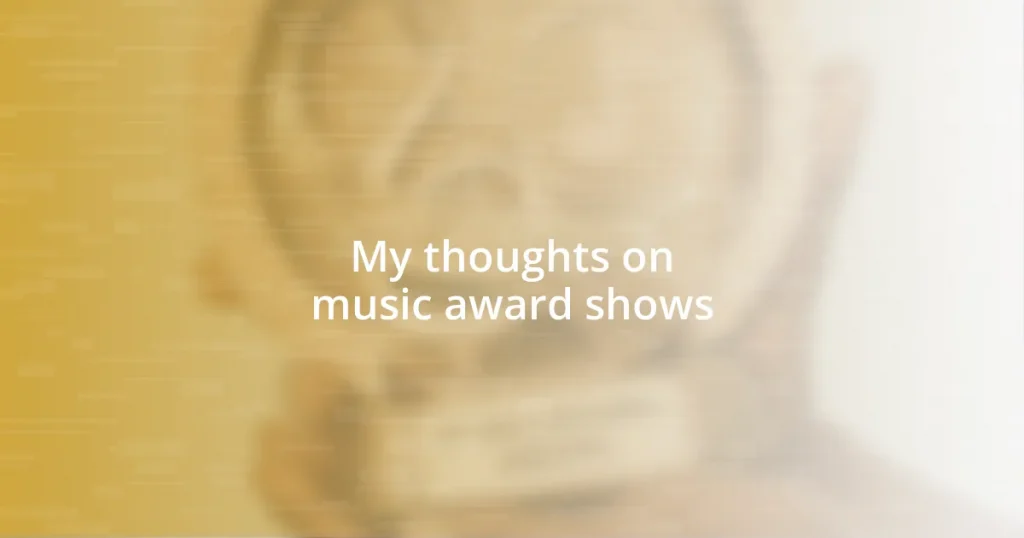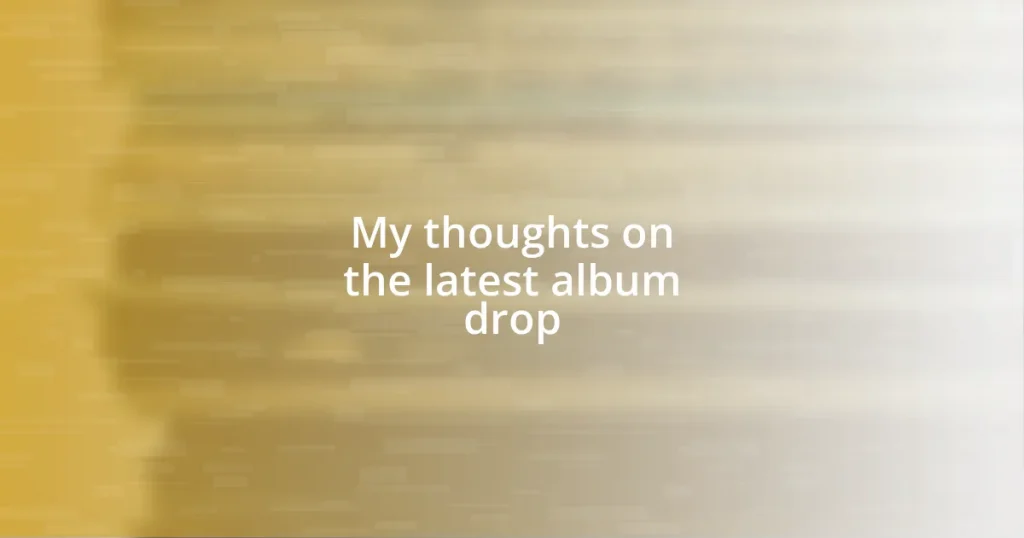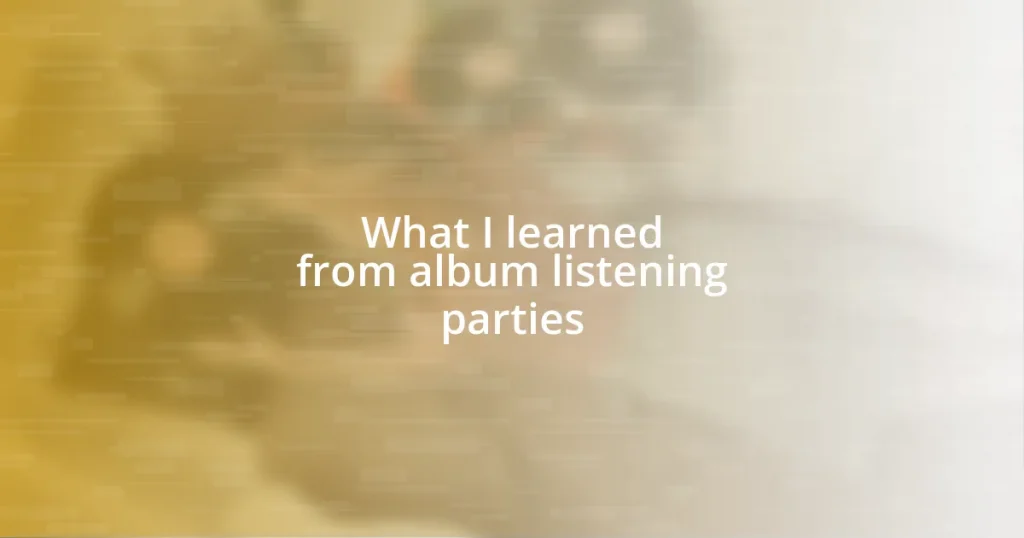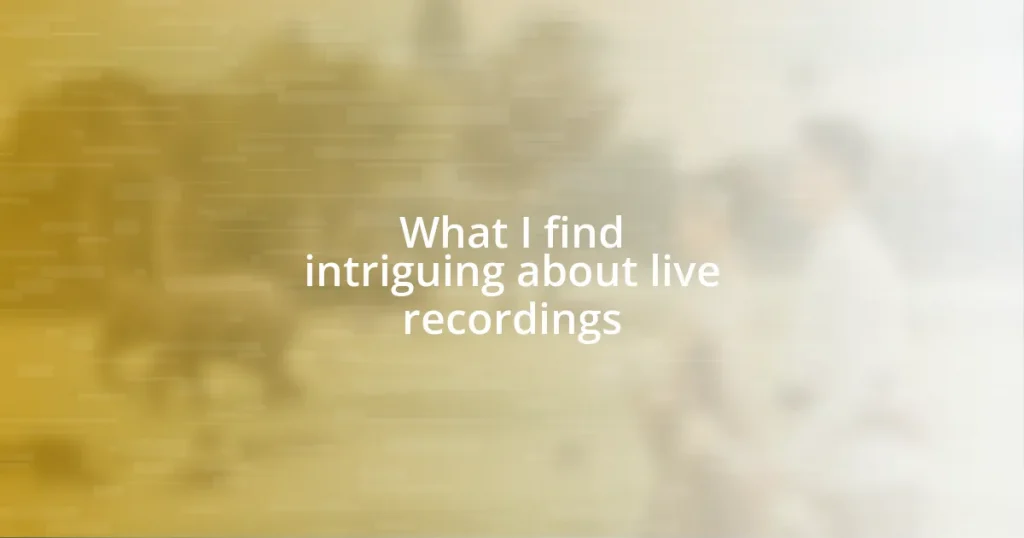Key takeaways:
- Music awards can significantly boost an artist’s career, influence musical trends, and spark creativity among artists and fans.
- Criticisms of music award shows include lack of diversity, predictable winners, commercial bias, exclusivity for indie artists, and overemphasis on spectacle over artistic merit.
- Alternatives like local festivals, online voting platforms, and collaborative projects foster genuine connections and celebrate creativity without the competitive nature of traditional awards.
- The future of music awards may focus on transparency, leveraging technology for accessibility, and celebrating authenticity over spectacle, reflecting changing audience values.
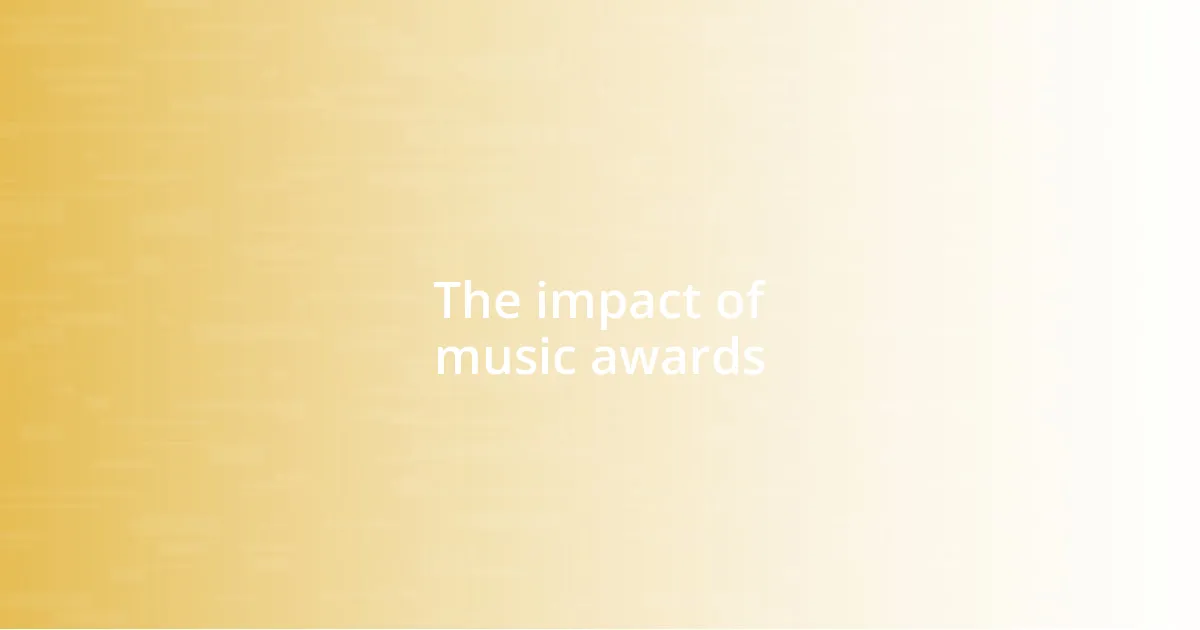
The impact of music awards
Music awards have a unique ability to elevate an artist’s career, sometimes catapulting them into the spotlight overnight. I remember watching a lesser-known artist win a Grammy, and I couldn’t help but feel their joy as they took the stage—eyes wide, tears flowing. Isn’t it fascinating how a single moment can change everything for someone?
The impact extends beyond individual careers; it can shape musical trends and genres. For instance, when an award-winning artist merges different styles, it inspires others to experiment and innovate. Have you ever discovered a new favorite song or genre because of an awards show performance? I have, and it sparked a whole new chapter in my music journey.
On the flip side, music awards can also create a sense of exclusion or competition, as fans and artists alike grapple with the question of who truly deserves recognition. I’ve felt that tension myself, debating whether a mainstream artist’s commercial success outweighs the raw talent of an indie musician. These sentiments highlight a complex relationship between recognition and artistry—one that every music lover navigates.
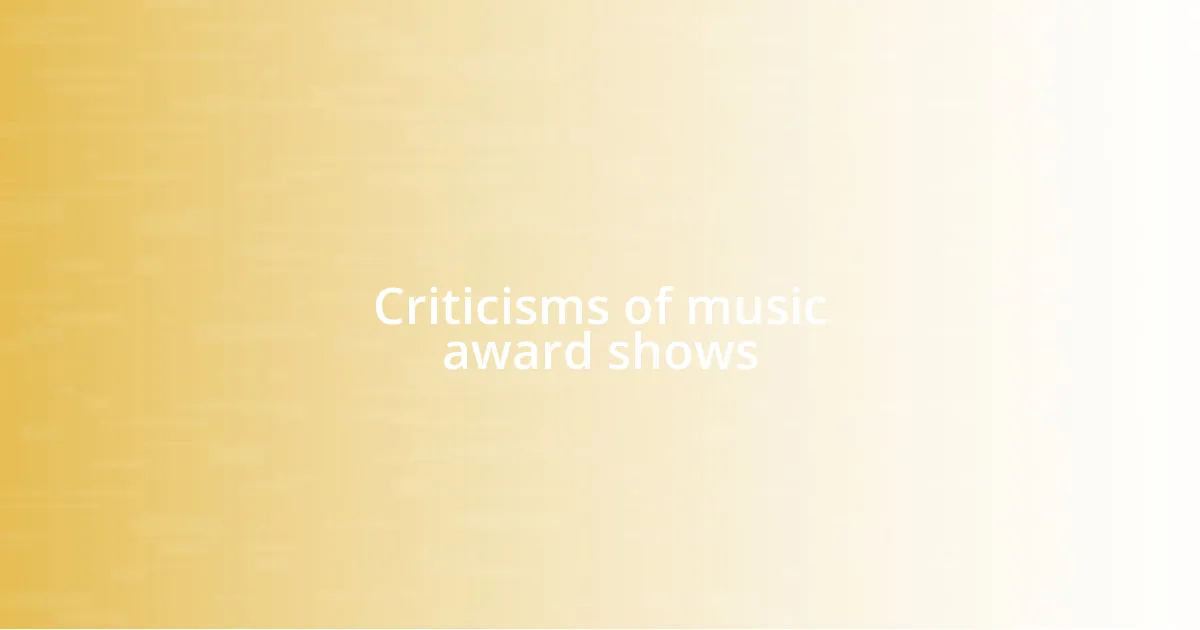
Criticisms of music award shows
When it comes to music award shows, criticisms often arise regarding their fairness and transparency. I remember watching a live stream of an awards show where several deserving artists were overlooked for nominations, leaving their fans feeling frustrated. This sentiment resonates with many, as there’s a prevailing belief that industry politics often influence the outcomes more than genuine talent or fan support.
Here are some specific criticisms often voiced by fans and critics alike:
- Lack of diversity: Many award shows have faced backlash for failing to acknowledge artists from various backgrounds and genres.
- Predictable winners: There’s a common feeling that certain artists are favored regardless of the competition, leading to repetitive outcomes.
- Commercial bias: The idea that chart success often overshadows artistic innovation can leave fans disillusioned.
- Exclusivity: Smaller or indie artists frequently find it challenging to gain recognition, which can create a divide within the music community.
- Overemphasis on performance: Spectacle sometimes takes precedence over artistic merit, turning the awards into more of a show than a true celebration of music.
These viewpoints not only reflect the frustrations of fans but also provoke deeper conversations about what recognition in music truly means.
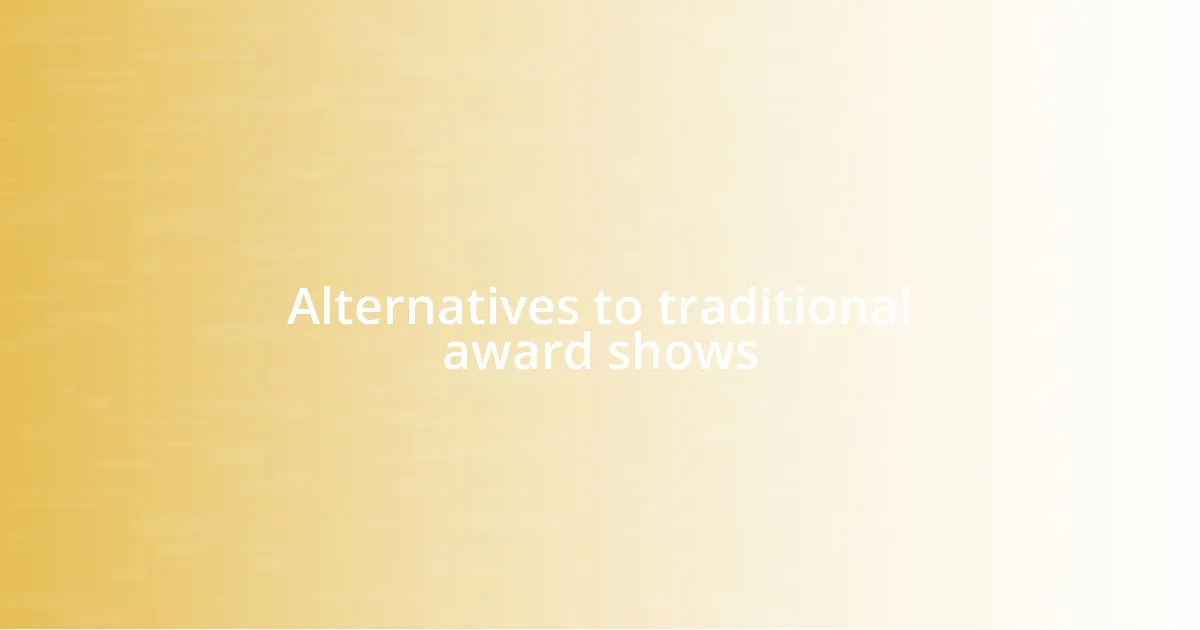
Alternatives to traditional award shows
Award shows certainly paint a grand picture of the music industry, but alternatives can be just as impactful, if not more so. I’ve attended local music festivals, where the atmosphere is far more genuine and electric. Seeing artists perform live for captivated audiences without the backdrop of awards feels like an authentic celebration of creativity and passion. Have you ever been lost in the energy of a small venue, realizing that this is where true artistry shines? I have, and it’s a reminder that music thrives in grassroots settings.
Another alternative gaining traction is online music platforms that integrate listener voting and feedback. I recall participating in a music competition where fans could cast votes through social media, which felt empowering. It created a sense of community and allowed real fans to elevate their favorite artists, contrasting sharply with the often opaque processes of traditional award shows. Isn’t it refreshing to see artists valued based on the direct support of their fans rather than industry gatekeepers?
Collaborative projects also serve as a fantastic alternative to award shows. I’ve seen artists come together for charity singles or collaborative albums that celebrate diverse musical backgrounds and styles. This kind of creativity doesn’t just foster a sense of unity; it showcases real talent stripped from the glitter of awards. It’s a beautiful reminder that music is about connection rather than competition. How about you? Have you ever found joy in a collaboration that felt more noteworthy than any award?
| Alternative Format | Pros |
|---|---|
| Local Music Festivals | Genuine atmosphere; immersive fan experience |
| Online Voting Platforms | Empowered fans; democratized recognition |
| Collaborative Projects | Focus on unity; diverse expression |
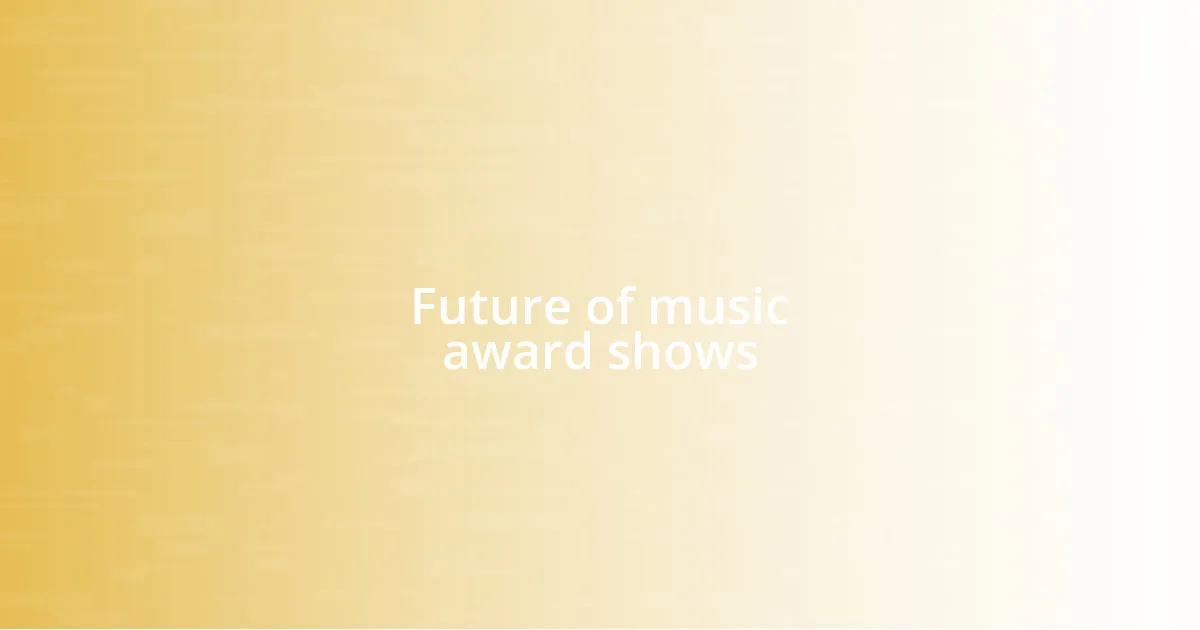
Future of music award shows
The future of music award shows seems poised for transformation, reflecting the evolving landscape of the music industry. I’ve noticed a surge in hybrid formats that blend virtual and in-person experiences, making these events more accessible to global audiences. Isn’t it interesting how technology shapes our interactions with art? It could be a game-changer, allowing artists from all corners of the world to participate without the limitations of travel and expenses.
I believe the emphasis on transparency will play a pivotal role moving forward. As a fan, nothing frustrates me more than the unclear nomination processes. With the rise of social media and direct fan engagement, there’s a real opportunity for award shows to embrace a more democratic approach to voting. Imagine a scenario where fans not only have a say in nominations but also in the judging criteria, making the awards feel truly representative of the musical landscape we cherish.
Lastly, I think we’ll see a shift toward celebrating authenticity over spectacle. I recall attending an event where the focus lay on intimate storytelling behind each song rather than elaborate performances. That connection left me feeling more moved than any grand production ever could. As audiences crave sincerity, award shows could evolve to highlight the heart and soul of music, celebrating the stories and struggles behind the creations. Have you felt that connection with music that transcends performances? It really underscores the idea that at the heart of it all, music is about shared experiences.
